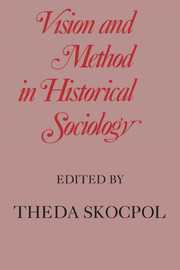Book contents
- Frontmatter
- Contents
- Preface
- 1 Sociology's Historical Imagination
- 2 The Social and Historical Landscape of Marc Bloch
- 3 Beyond the Economistic Fallacy: The Holistic Social Science of Karl Polanyi
- 4 Configurations in History: The Historical Sociology of S. N. Eisenstadt
- 5 Theoretical Generalization and Historical Particularity in the Comparative Sociology of Reinhard Bendix
- 6 Destined Pathways: The Historical Sociology of Perry Anderson
- 7 E. P. Thompson: Understanding the Process of History
- 8 Charles Tilly's Collective Action
- 9 The World System of Immanuel Wallerstein: Sociology and Politics as History
- 10 Discovering Facts and Values: The Historical Sociology of Barrington Moore
- 11 Emerging Agendas and Recurrent Strategies in Historical Sociology
- An Annotated Bibliography on Methods of Comparative and Historical Sociology
- Notes on the Contributors
3 - Beyond the Economistic Fallacy: The Holistic Social Science of Karl Polanyi
Published online by Cambridge University Press: 05 June 2012
- Frontmatter
- Contents
- Preface
- 1 Sociology's Historical Imagination
- 2 The Social and Historical Landscape of Marc Bloch
- 3 Beyond the Economistic Fallacy: The Holistic Social Science of Karl Polanyi
- 4 Configurations in History: The Historical Sociology of S. N. Eisenstadt
- 5 Theoretical Generalization and Historical Particularity in the Comparative Sociology of Reinhard Bendix
- 6 Destined Pathways: The Historical Sociology of Perry Anderson
- 7 E. P. Thompson: Understanding the Process of History
- 8 Charles Tilly's Collective Action
- 9 The World System of Immanuel Wallerstein: Sociology and Politics as History
- 10 Discovering Facts and Values: The Historical Sociology of Barrington Moore
- 11 Emerging Agendas and Recurrent Strategies in Historical Sociology
- An Annotated Bibliography on Methods of Comparative and Historical Sociology
- Notes on the Contributors
Summary
Karl Polanyi's intellectual work stands among the most significant and original contributions to social science scholarship in the period since the end of World War I. In particular, his book The Great Transformation is now widely recognized to be a classic of sociological thought. Although Polanyi was influenced by the major figures of nineteenth- and early twentieth-century sociology, his work cannot easily be classified within one or another of the major social science traditions. There are echoes throughout The Great Transformation of Marx, Weber, Durkheim, and other classical thinkers, but Polanyi was not a direct disciple of any of these theorists. In fact, in anthropology, where Polanyi's influence has been greatest, the uniqueness of his contribution is suggested by the recognition of a distinctly Polanyian paradigm in economic anthropology that stands in conflict with both Marxist and substantivist traditions.
Significantly, such a paradigm or tradition cannot be located in the other disciplines that were central to Polanyi's work – history, economics, and sociology. While his ideas have influenced subgroups within each of these disciplines, there has been no recognizable attempt to carry out a Polanyian research program in any of them, and for a long period there was almost no secondary literature on Polanyi.
- Type
- Chapter
- Information
- Vision and Method in Historical Sociology , pp. 47 - 84Publisher: Cambridge University PressPrint publication year: 1984
- 59
- Cited by



